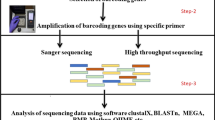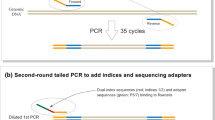Abstract
PCR-based methods have been developed to differentiate four species of commercially important eels (Anguilla anguilla, A. rostrata, A. japonica, A. australis). By means of universal primers a 464 base pair (bp) section of the cytochrome b gene was amplified. The amplicon was sequenced and restriction enzymes were selected for RFLP analysis; a short part (123 bp) of the 464 bp section was amplified by another set of primers and used for SSCP analysis.
The suitability of RFLP and SSCP for differentiating hot-smoked eel was verified by a collaborative study.
Similar content being viewed by others
Author information
Authors and Affiliations
Additional information
Electronic Publication
Rights and permissions
About this article
Cite this article
Rehbein, H., Sotelo, C.G., Perez-Martin, R.I. et al. Differentiation of raw or processed eel by PCR-based techniques: restriction fragment length polymorphism analysis (RFLP) and single strand conformation polymorphism analysis (SSCP). Eur Food Res Technol 214, 171–177 (2002). https://doi.org/10.1007/s00217-001-0457-y
Received:
Published:
Issue Date:
DOI: https://doi.org/10.1007/s00217-001-0457-y




